Notable wins in the climate and environmental justice space to inspire us in our fight for a better, greener, and fairer world for all.
Global – Court found activists’ right to protest had been violated
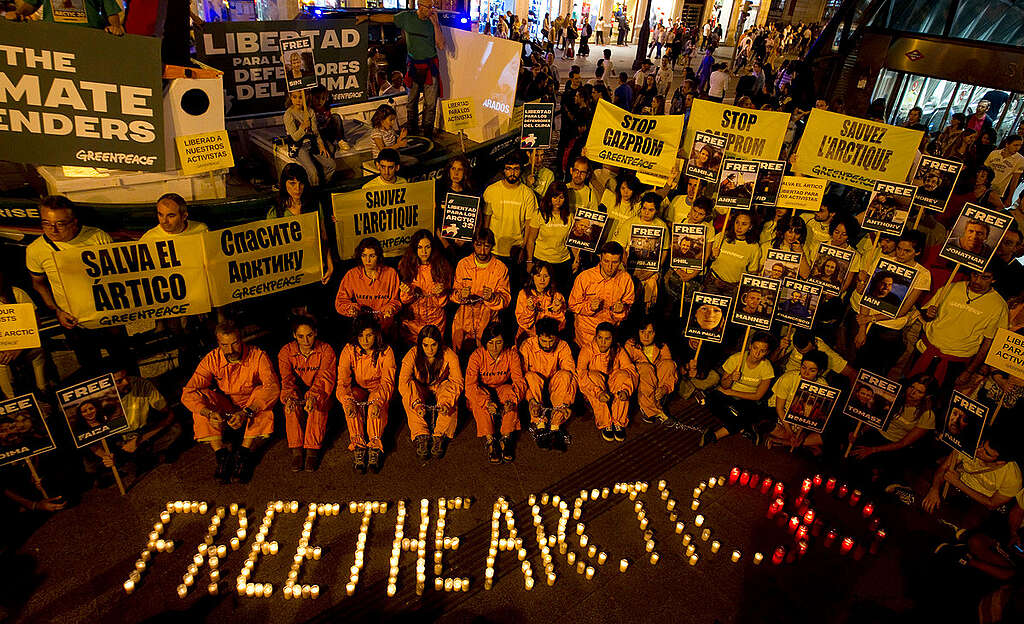 Greenpeace supporters protest with an Arctic Sunrise replica at the Puerta del Sol in Madrid to demand the release of the Arctic 30. This protest is part of an emergency Global Day of Solidarity for the ‘Arctic 30.’ © Jose Luis Roca / Greenpeace
Greenpeace supporters protest with an Arctic Sunrise replica at the Puerta del Sol in Madrid to demand the release of the Arctic 30. This protest is part of an emergency Global Day of Solidarity for the ‘Arctic 30.’ © Jose Luis Roca / GreenpeaceOn 27 June 2023, the European Court of Human Rights issued its ruling in the long-running case of the Arctic 30 v Russia, finding that Russian authorities arbitrarily detained the 28 Greenpeace activists and two freelance journalists and violated their right to freedom of expression.
In September 2013, the group who became known as the Arctic 30 were detained on suspicion of piracy after Russian commandos boarded the Greenpeace ship Arctic Sunrise and seized the ship, following a protest against Arctic oil production at the platform Prirazlomnaya in the Pechora Sea, off Russia’s north coast. They spent two months in detention centres – first in the Arctic city of Murmansk and later in St Petersburg – before being released on bail and finally freed altogether and allowed to leave Russia.
“The court has recognised the truth that climate activism is necessary to protect everything that is dear to us, stating it is ‘an expression of opinion on a matter of significant social interest’. Courts and governments must defend people and nature, not big polluters,” said Faiza Oulahsen, climate and energy campaign lead at Greenpeace Netherlands and one of the Arctic 30.
Europe – EU backs landmark law to restore Europe’s nature
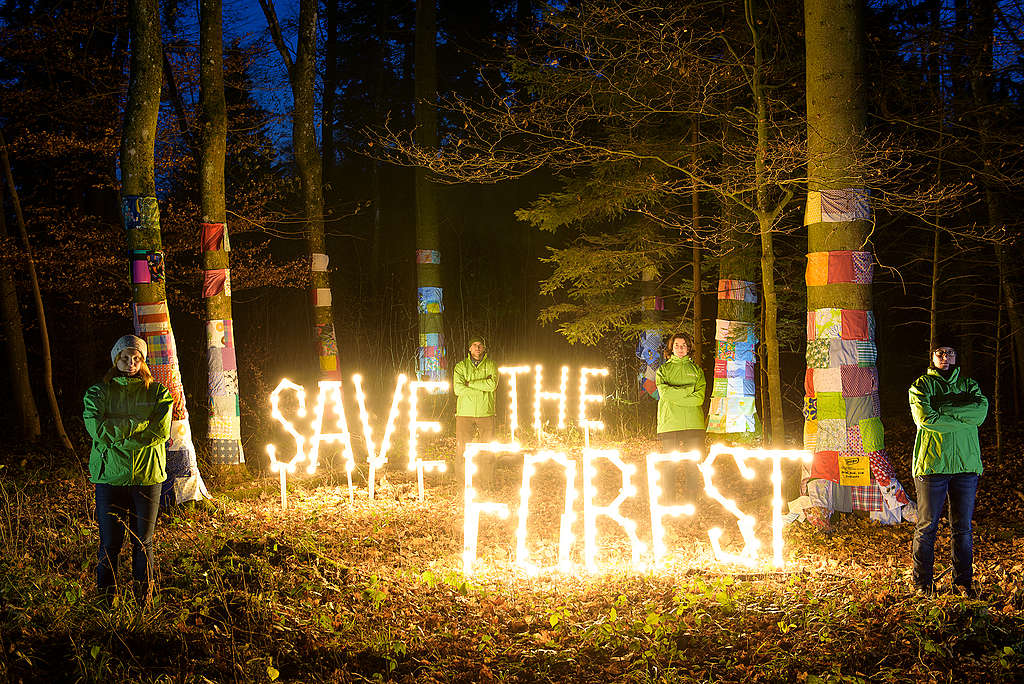 Save the Forest light installation in Switzerland © Nicolas Fojtu / Greenpeace
Save the Forest light installation in Switzerland © Nicolas Fojtu / GreenpeaceOn the 12th of July 2023, The European Parliament voted in favour of legally binding targets to restore degraded natural areas in the EU. In 2021, the European Environment Agency found that 81% of the EU’s ecosystems are in either a “poor” or “bad” condition.
The nature restoration law – the first major piece of legislation to protect biodiversity in the EU in the last 30 years – had withstood strong opposition from conservative and right-wing members of parliament, backed by industrial farming lobbyists.
United States – Young activists win climate lawsuit
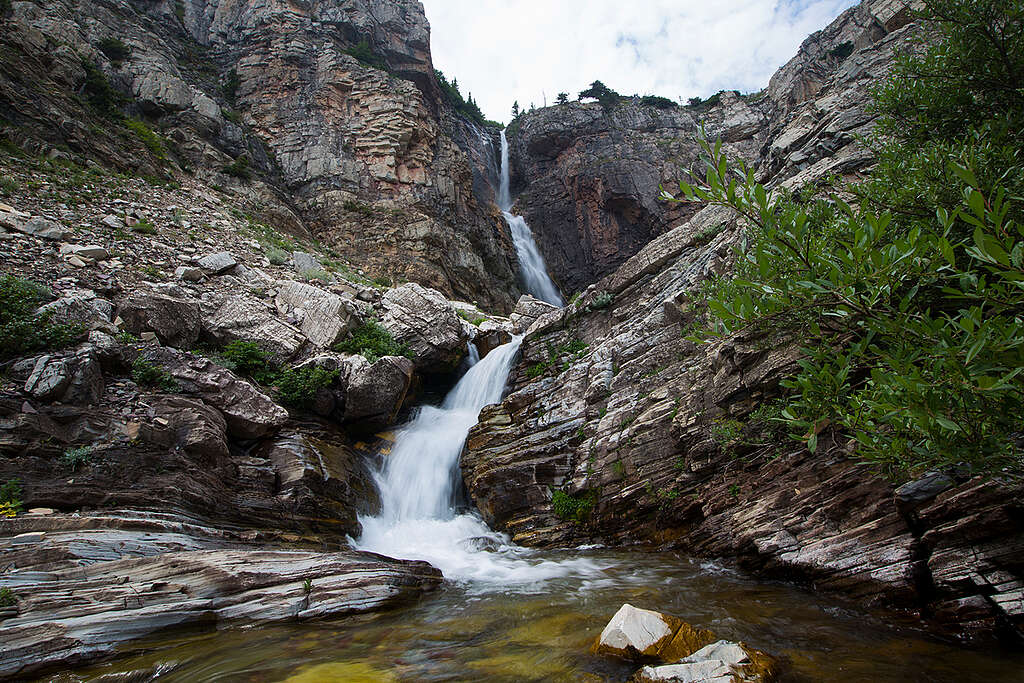 Apikuni waterfall in Glacier National Park in Montana during the summer snow melt. © Greenpeace / Tim Aubry
Apikuni waterfall in Glacier National Park in Montana during the summer snow melt. © Greenpeace / Tim AubryOn 14 August 2023, young people in Montana just won a landmark case that could set the precedent for future lawsuits related to climate change. 16 young plaintiffs, aged 5 to 22, alleged that Montana’s energy policies violated their right to a clean and healthful environment, which is guaranteed in their state’s constitution.
The judge agreed, saying that Montanans “have a fundamental constitutional right to a clean and healthful environment, which includes climate as part of the environmental life-support system.”
Thailand. Activists against power plant in South Thailand acquitted.
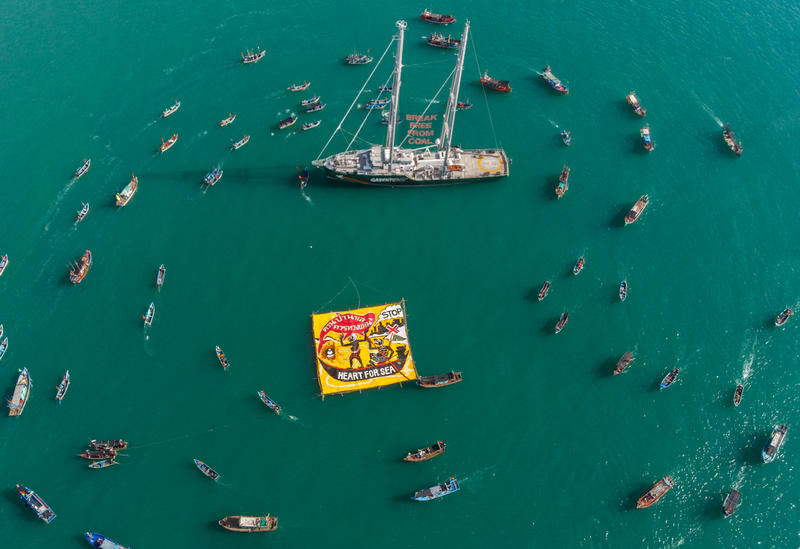 The Rainbow Warrior arrives in Teluk Patani to stand in solidarity with communities expressing their concerns about the coal-fired project in Thepha district. © Arnaud Vittet / Greenpeace
The Rainbow Warrior arrives in Teluk Patani to stand in solidarity with communities expressing their concerns about the coal-fired project in Thepha district. © Arnaud Vittet / GreenpeaceOn 21 July 2023, activists from the Teluk Patani anti-coal network were finally acquitted of police charges from a Thepa coal-fired power plant protest back in 2017. The activists were marching to submit a petition letter to then Prime Minister General Prayut Chan-o-cha to protest the development of a coal-power plant in their hometown Thepa, a coastal district in the Songkhla province in South Thailand.
The plant would be the largest of its kind in Thailand, with harmful consequences for the environment and the health of the people. 17 community leaders were arrested at the protest and charged with violating the Public Gathering Act and the willful obstruction of a police officer, among others.
In the last six years since, lawyers have worked with the local communities to defend their constitutional rights for expression and to oppose the Strategic Lawsuit Against Public Participation (SLAPP) case. The Supreme Court’s acquittal of the protesters of the charges represents a big win for Thailand’s anti-coal network and to the people who insist on speaking truth to power!
Europe – EU to quit the Energy Charter treaty
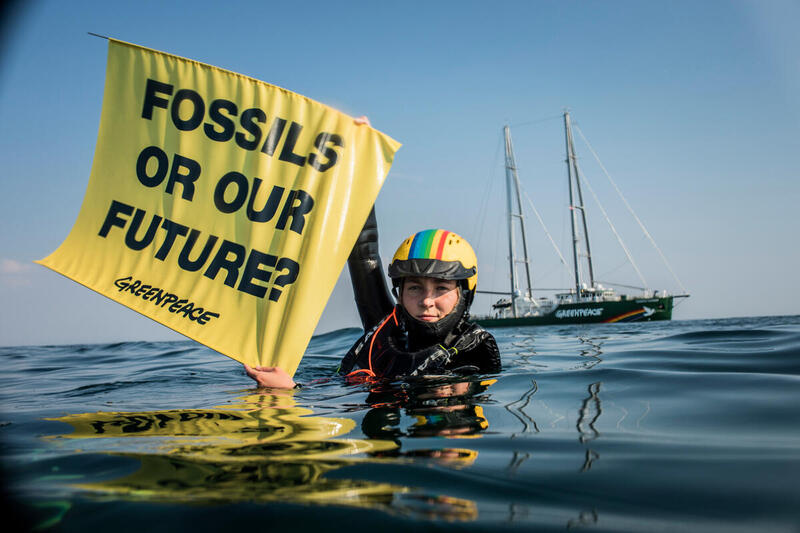 Greenpeace Denmark activists carrying out an action in the Danish North Sea. © Andrew McConnell / Greenpeace
Greenpeace Denmark activists carrying out an action in the Danish North Sea. © Andrew McConnell / GreenpeaceIn June 2023, the European Commission stated that it’s readying a proposal for EU countries to jointly quit the toxic and dangerous Energy Charter treaty, after some governments already pledged to leave over climate concerns. The 1998 Energy Charter Treaty, which has around 50 signatories, allows energy companies to sue governments over politics that damage their investments.
Even if the countries exit the treaty, there is currently a sunset clause that would allow them to be liable for lawsuits 20 years after. This disastrous investment treaty — that protects the fossil fuel industry and its profits over people’s lives — has to be abolished.
Yemen – More than 1M barrels of oil removed from decaying supertanker
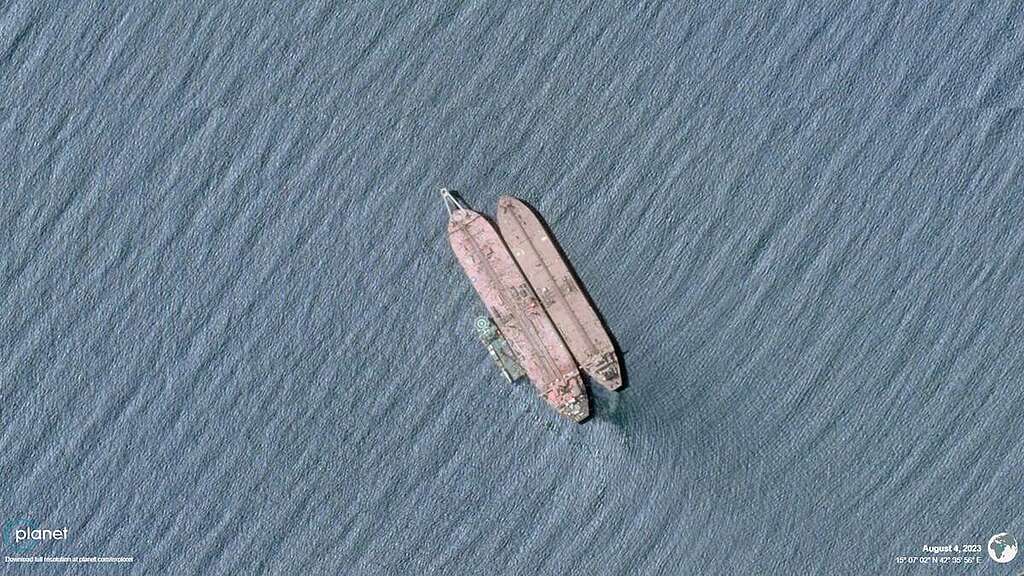 Satellite pictures showing the rescue vessels NDEAVOR and NAUTICA (now renamed YEMEN) alongside or close to the FSO SAFER off the coast of Yemen, in the Red Sea. © Greenpeace / Planet Labs PBC 2023
Satellite pictures showing the rescue vessels NDEAVOR and NAUTICA (now renamed YEMEN) alongside or close to the FSO SAFER off the coast of Yemen, in the Red Sea. © Greenpeace / Planet Labs PBC 2023In a win in preventing a major humanitarian and environmental catastrophe, more than a million barrels of oil were removed from the decaying FSO SAFER supertanker off Yemen’s coast. The potential consequences of an oil spill in the Red Sea could inflict irreparable damage on coastal communities, fragile ecosystems, and marine life, exacerbating both the ongoing humanitarian crisis and the impacts of the climate crisis in the region.
It is a significant victory but also a stark reminder that all too often, communities and governments are left to clean up the mess created by the oil industry.
The Netherlands – Permit for plastics factory cancelled
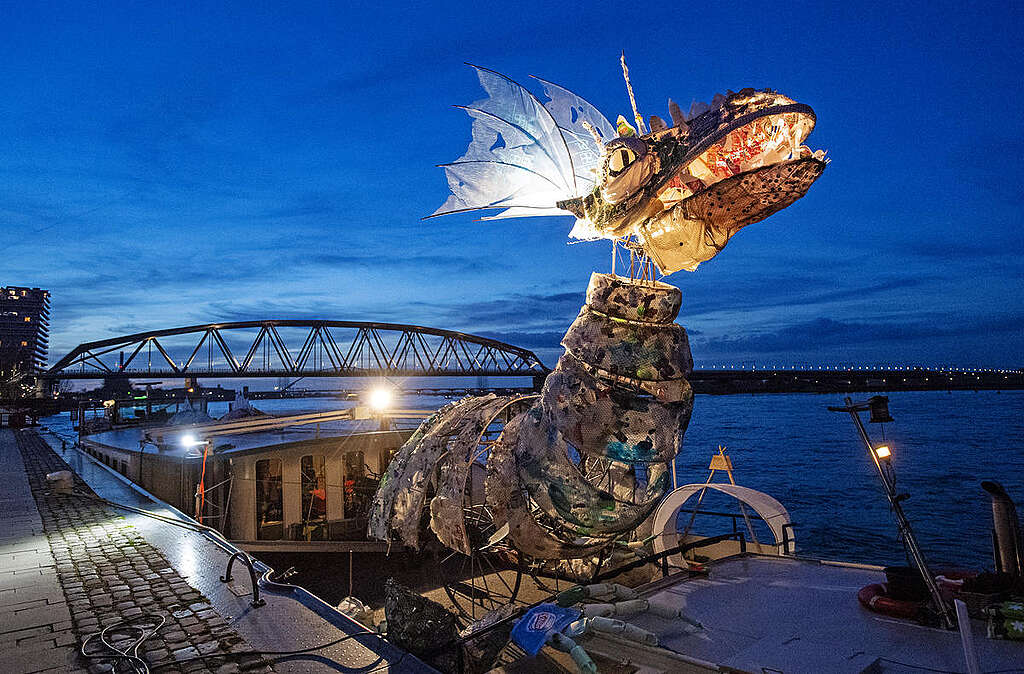 The Plastic Monster ship, which carries a huge artwork made of plastic waste during the Plastival in Nijmegen, Netherlands, a festival for a world without single-use plastic. © Marten van Dijl / Greenpeace
The Plastic Monster ship, which carries a huge artwork made of plastic waste during the Plastival in Nijmegen, Netherlands, a festival for a world without single-use plastic. © Marten van Dijl / GreenpeaceIn an historic win for people, the environment and the climate, a Belgian court has ruled that INEOS’ new €3bn plastics project in the port of Antwerp is not legal. The project is now suspended. INEOS had failed to tell authorities the full extent of its predicted impact on the environment, which means these authorities should not have authorised the project. This new ruling is the culmination of a long battle, brought on by the Dutch provinces of Zeeland and Noord-Brabant, whose communities and ecosystems would have borne the brunt of the toxic plastic pollutants. In order to tackle plastic pollution, which has worldwide implications, it has to be stopped at the source.
South Africa – Young professionals take on energy crisis with Common Power
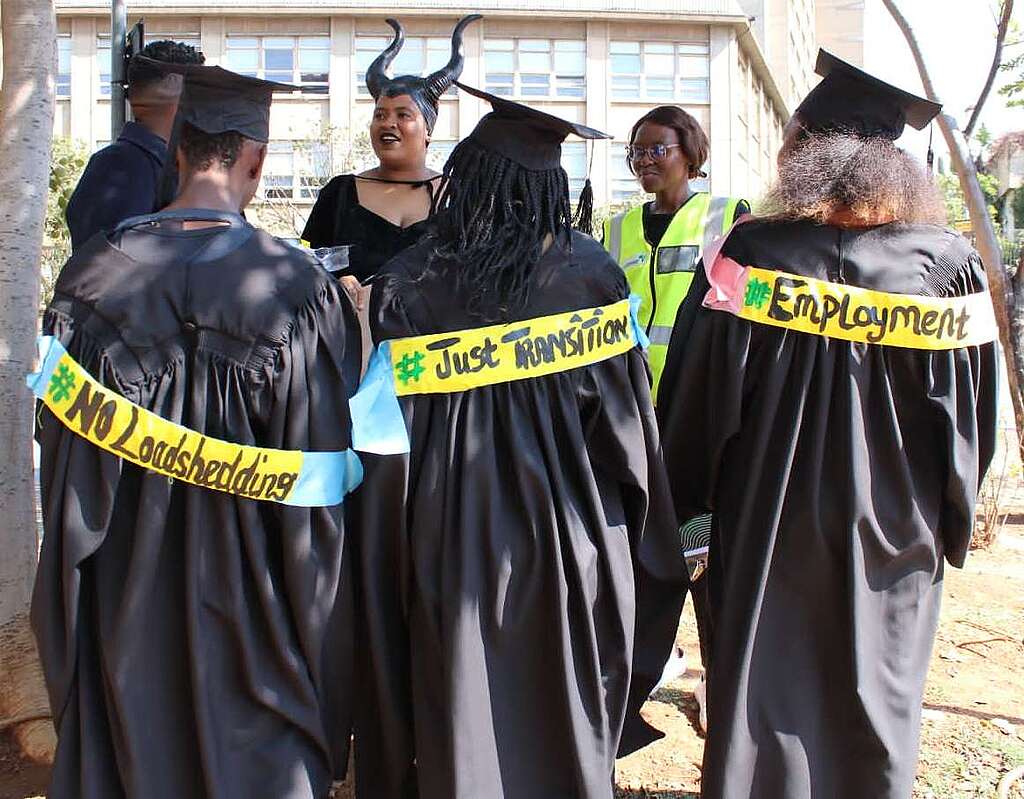 Eco Shape Shifters and Ubuntu Hub activists protesting against load shedding in Johannesburg, South Africa © Andile Mlambo / Ubuntu Hub
Eco Shape Shifters and Ubuntu Hub activists protesting against load shedding in Johannesburg, South Africa © Andile Mlambo / Ubuntu HubIn South Africa, Common Power and Greenpeace Africa are uplifting community energy initiatives by young professionals to help address the energy crisis.
Since the start of South Africa’s energy crisis in 2007, the country has experienced multiple waves of rolling blackouts called load shedding, as the country’s demand for electricity exceeds its (fossil fuel -based, corporate) ability to supply.
Common Power has launched a pilot programme to recruit and train a team of experienced developers – who will go on to mentor others – in the development and delivery of the first community solar and batteries project of its kind.

 1 year ago
51
1 year ago
51


